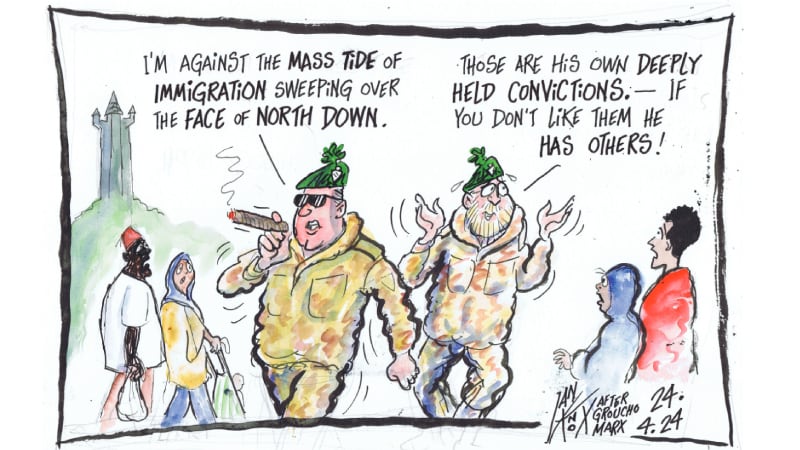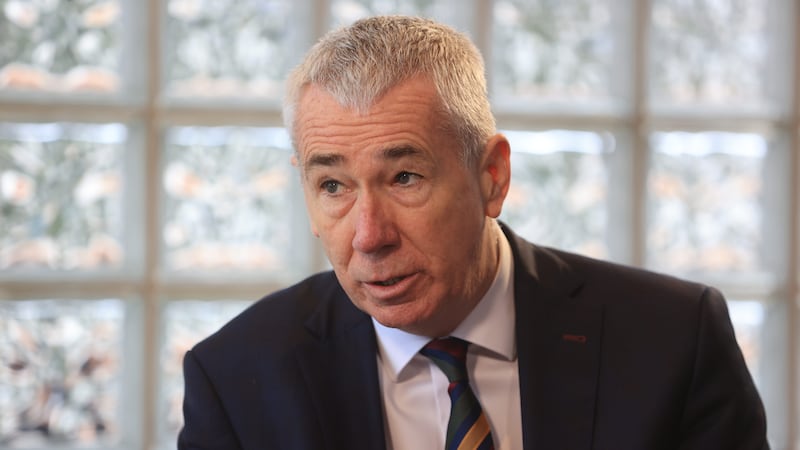Increasingly it feels like a relatively small number of people on this island are involved in a ‘long war’ while the vast majority of us are more focussed on a ‘long peace’. When Sinn Fein’s Michelle O’Neill asserted that Northern Ireland “isn’t British” at the Conservative Party conference it was not a surprise, but it was revealing. Her comment provides a clue as to why power sharing is not currently working.
Over our history too many of the leaders in our society, particularly some of the more extreme elements, have promoted a suffocatingly narrow perspective on identity. The Belfast Agreement asserted the rights of people here to identify “as British, Irish or both”. Is the reality not that by far the most accurate label for most of us is ‘both’?
Northern Ireland is actually as ‘British as Finchley’, even though it is clearly not as English and it is also as ‘Irish as Cork’, although our Irishness is distinct from that of the Republic. What the agreement didn’t mention, is that in effect we are all northern Irish, irrespective of our different views on the constitutional position.
It is an identity that is a flexible, multi-layered concept. We should embrace the unique access to various identities that northern Irishness affords us and resist attempts to put us into simple boxes. Extreme ideologies have used identity in order to exclude and demonise the ‘other’, which has too often hampered the development of good relations across these islands.
Bearing that in mind, we should not forget that it was the political middle ground that opened up prospects for a peaceful future, without conflict or division. While they’ve now been manipulated into the margins of politics, we mustn’t forget that the architects of the 1998 agreement ultimately won the argument, over more extreme ideologies that then moderated their positions in pursuit of power.
It is also clear that the two governments did not support the middle ground properly. Then, they compounded matters in the St Andrews Agreement by changing the way the First Minister was designated, which actually entrenched a narrow way of looking at identity and politics – reinforcing the ‘them and us’ mentality that makes every election into an exercise in ‘if you don’t vote for us you get them’.
Despite that electoral advantage, the DUP and Sinn Féin have since shown an ability to gain power, but little potential to do much with it.
Looking to the future, if we are to have an executive and it is to share ‘responsibility’ properly, then there should be an explicit, public commitment by all parties, in order to qualify for places in the executive, to promote their chosen constitutional preferences first and foremost by prioritising making this place work for the benefit of all its people. They mightn’t stick to their promises, but we’d have a standard to hold them to.
On that basis, we should then move to joint First Ministers. Whatever the constitutional position we who live in Northern Ireland have to share it and so the least we should expect is that we are governed by politicians who work constructively for the benefit of us all. Make these changes and then call an election to let the electorate decide.
TREVOR RINGLAND
Holywood, Co Down
Brexit not in best interest of people of Ireland
Everyone should be relieved that the threat to thousands of jobs in Bombardier from proposed US tariff changes appears to have been averted. It will not have escaped people’s notice, however, that the rescue came not from the DUP and the influence that it exerts on Mrs May’s government through its confidence and supply agreement, nor did it come from any prime ministerial appeal to the US-British ‘special relationship’, which is being so much counted on in the future, but from Airbus, which is a flagship industrial project of the EU, at a time when Britain is still a member. It surely reinforces the message that Brexit and especially a hard Brexit, is not in the interest of people in any part of Ireland, including those who work for what is a fine global firm in east Belfast. It would not be contrary to the interests of any branch of unionism to use their influence at Westminster to promote a moderate outcome that preserves the maximum amount of UK ties with the EU post-Brexit short of continuing membership, a form of external association.
Much is made from time to time about the dangers of far-reaching constitutional change brought about by a tiny margin in a referendum. Yet this is precisely what the British government is attempting to push through on foot of the Brexit referendum result. It is not a good day, when the Chinese Communist Party meeting in Congress can point to President Trump’s performance in America and the UK pursuit of Brexit as demonstration of their thesis that liberal democracy does not work.
MARTIN MANSERGH
Tipperary, Co Tipperary
Constitutional wishes
Malachy Scott’s reply (October 23) to my letter (October 5) was interesting. Is accepting the political and constitutional wishes of the majority not fundamental to democracy? If a majority in Ireland wants the country to be unified then what reason is there for preventing this? Again it is ignored that Irish nationalists did not want to be part of a United Kingdom or their country to be partitioned. Irish nationalists were forced to accept that. Also if Irish people in this part of Ulster have a right to national freedom, as Malachy stated, how will that be implemented without the imposition of a united Ireland on unionists? In any case there is a way that Irish people in Ulster can assert their inalienable right to national freedom while recognising the democratic rights of unionists, the rights of unionists to participate in local government and their right to self-determination. The concept of Dáil Uladh outlined as one of four provincial assemblies in the Éire Nua program would enable the Brythonic diaspora of Ulster to utilise local executive, legislative and judicial power in order to safeguard their cultural identity and autonomy.
ÉAMONN MacGRIANNA
Belfast BT11
Outspoken advocate
I grew up in Ireland when there were no positive articles about stammering. The article ‘Belfast teenager urges people to show understanding of those with a stammer’ (October 19) was highly positive. It makes me feel good to think that this article will help some young people who stammer in Northern Ireland. Hats off to Luke Fleming for being such an outspoken advocate. Of course the same percentage of people stammer in Northern Ireland as in any other country. I would like to mention that a US-based charity The Stuttering Foundation gives out so many free resources to stammerers of all ages in the form of downloadable books, brochures and streaming videos . What is interesting is that the site has many articles on celebrities who stammer, such as Rowan Atkinson, Lewis Carroll, Bruce Willis and the actor Sam Neill, who was born in Omagh, Co Tyrone.
MARY BURKE
Boston, Massachusetts
Electrical vehicles
Thanks to Richard Ramsey (Business Insight, October 17) for an interesting article on the increasing sales of electric vehicles and their impact on how we use our roads.
I have owned a second-hand Nissan Leaf for more than a year. It is a very different vehicle to any petrol or diesel car I have driven. A recent article on the web (Treehugger site, 21/10) mentioned the Mayton Hotel in North Carolina. It has installed two charge points as part of an upgrade to its parking area. The installation was ‘Basically just extension cords with a higher amperage and a 220v supply’, the cost of use is ‘negligible’. The hotel said just one extra visitor, who stayed because he could charge his car, more than covered their costs.
The Northern Ireland charge point network is quite extensive – and hopefully still growing. A point near a hotel or restaurant will very likely get extra custom. Some charge points are located at park and rides or similar sites with few facilities.
PHIL ALLEN
Carrickfergus, Co Antrim







